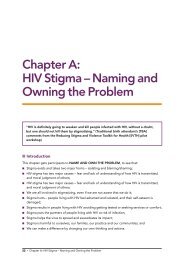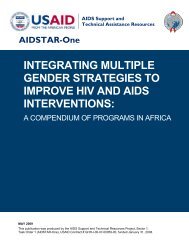Guide for Community Assessments on Women's Health Care - ICRW
Guide for Community Assessments on Women's Health Care - ICRW
Guide for Community Assessments on Women's Health Care - ICRW
Create successful ePaper yourself
Turn your PDF publications into a flip-book with our unique Google optimized e-Paper software.
Additi<strong>on</strong>al Activities<br />
● ● COMMUNITY HEALTH WALK – to explore health issues in a small community<br />
● ● SITE VISIT – to look at services in health or other facilities serving women<br />
Joint Workshop (Day 5)<br />
Bring all the groups together to share their findings and do joint problem solving.<br />
Pulling It All Together – The Round Table<br />
●●<br />
●●<br />
●●<br />
Review and compare findings from different sites.<br />
Agree <strong>on</strong> priority health issues, gaps in services and barriers to women’s access to services.<br />
Make recommendati<strong>on</strong>s <strong>on</strong> how to solve some of the problems raised.<br />
The Full Package or Selected Activities<br />
Using this full package of activities <str<strong>on</strong>g>for</str<strong>on</strong>g> a series of five workshops will provide participants a<br />
comprehensive understanding of women’s health needs. However, using just <strong>on</strong>e or two of the<br />
activities during a visit also can yield valuable insight into women’s and other community members’<br />
health issues.<br />
Key Questi<strong>on</strong>s<br />
Each workshop is aimed at finding answers to the following key questi<strong>on</strong>s:<br />
1. What do different stakeholder groups understand by the term “women’s health”? What are their<br />
attitudes toward women’s health and HIV-positive women’s health?<br />
2. What health issues are perceived to have the biggest impact <strong>on</strong> women in general, and <strong>on</strong> women<br />
living with HIV in particular? What cultural practices (e.g., female genital cutting, polygamy, wife<br />
inheritance) and social and envir<strong>on</strong>mental factors (such as HIV-related stigma and discriminati<strong>on</strong>,<br />
gender-based violence, etc.) have a negative impact <strong>on</strong> women’s health?<br />
3. What health services exist, including care and support <str<strong>on</strong>g>for</str<strong>on</strong>g> women with HIV and AIDS or other<br />
l<strong>on</strong>g-term, chr<strong>on</strong>ic or life-threatening c<strong>on</strong>diti<strong>on</strong>s?<br />
4. What are the gaps in services, including gaps in reproductive health and choices?<br />
5. What are women’s experiences of using these health services? Are HIV-positive women’s<br />
experiences significantly different from the experiences of other women?<br />
6. What barriers prevent women from using these services? Are these barriers different <str<strong>on</strong>g>for</str<strong>on</strong>g> HIVpositive<br />
women?<br />
7. Which women’s health issues need priority resp<strong>on</strong>ses and what kinds of resp<strong>on</strong>ses might be most<br />
appropriate? How can these be taken <str<strong>on</strong>g>for</str<strong>on</strong>g>ward by MPs, civil society organizati<strong>on</strong>s and others in<br />
parliament, or through other kinds of advocacy or lobbying?<br />
28 Chapter C: Facilitating <str<strong>on</strong>g>Community</str<strong>on</strong>g> Assessment Workshops

















